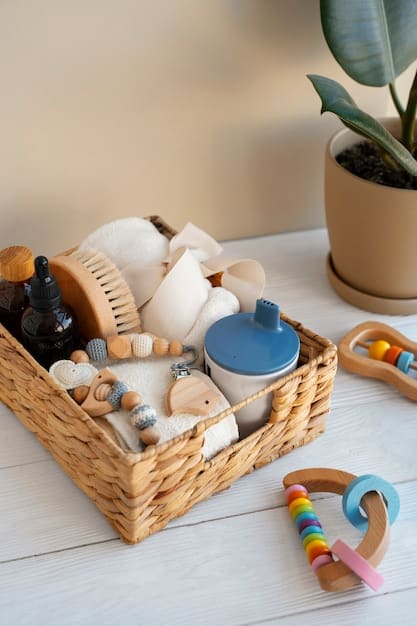Baby Skin Care: Expert Tips for Eczema and Dry Skin

Baby skin care, especially when dealing with conditions like eczema and dry skin, requires a gentle and consistent approach, focusing on moisturizing, avoiding irritants, and consulting with a pediatrician or dermatologist for personalized advice.
Taking care of a baby’s skin can feel overwhelming, especially when dealing with conditions like eczema and dry skin. This comprehensive guide provides baby skin care advice, diving into expert tips for treating eczema and dry skin, ensuring your little one’s comfort and health.
Understanding Infant Skin
Babies have incredibly delicate skin, much thinner and more sensitive than adult skin. This makes them more susceptible to dryness, irritation, and conditions like eczema. Understanding these differences is the first step in providing appropriate care.
Why is Baby Skin So Sensitive?
A baby’s skin barrier isn’t fully developed, making it less effective at retaining moisture and protecting against irritants. This increased permeability means harmful substances can be absorbed more easily, leading to potential skin issues.
Common Skin Conditions in Infants
Beyond dryness and eczema, babies are prone to other skin conditions such as diaper rash, cradle cap, and miliaria (heat rash). Recognizing these conditions early helps in implementing timely and effective treatments.
- Diaper Rash: Often caused by prolonged exposure to moisture and irritants in diapers.
- Cradle Cap: Manifests as scaly, greasy patches on the scalp.
- Miliaria: Small, raised bumps caused by blocked sweat ducts.
In summary, understanding the unique characteristics and vulnerabilities of infant skin sets the foundation for a targeted and gentle skincare routine.

Identifying Eczema in Babies
Eczema, also known as atopic dermatitis, is a common inflammatory skin condition that causes dry, itchy, and inflamed skin. It often appears in early infancy, requiring keen observation and prompt care.
Signs and Symptoms of Eczema
Eczema typically presents as red, dry, and scaly patches on the skin. In babies, it often appears on the face, scalp, elbows, and knees. The skin may be intensely itchy, leading to scratching and further irritation.
Triggers for Eczema Flare-Ups
Identifying and avoiding triggers is crucial in managing eczema. Common triggers include irritants like soaps, detergents, perfumes, and certain fabrics. Environmental factors such as dry air, heat, and allergens can also exacerbate eczema.
- Irritants: Soaps, detergents, perfumes, and certain fabrics.
- Allergens: Dust mites, pet dander, pollen, and certain foods.
- Environmental Factors: Dry air, heat, and humidity.
Recognizing both the symptoms and potential triggers of eczema is vital in proactively managing the condition and minimizing flare-ups.
Effective Eczema Treatment Strategies
Managing eczema involves a multi-faceted approach that includes gentle skincare, moisturizing, avoiding triggers, and, in some cases, medical treatments. Consistency and patience are key to alleviating discomfort and promoting healing.
Gentle Bathing Practices
Bathing should be kept short and infrequent to prevent drying out the skin. Use lukewarm water and mild, fragrance-free cleansers designed for sensitive skin. Pat the skin dry gently rather than rubbing.
Moisturizing is Essential
Moisturizers help to hydrate the skin and restore its barrier function. Apply a thick, fragrance-free emollient immediately after bathing and throughout the day, especially to areas prone to dryness and eczema.
Topical Corticosteroids and Other Medications
In severe cases, a pediatrician or dermatologist may prescribe topical corticosteroids to reduce inflammation and itching. Other medications, like topical calcineurin inhibitors, can also be used. It is important to follow medical advice closely.
In summary, a well-rounded treatment plan that incorporates gentle practices, consistent moisturizing, and appropriate medical interventions can significantly improve eczema symptoms and overall skin health.

Combating Dry Skin in Babies
Dry skin is a common concern for babies, especially during colder months or in dry climates. Proper hydration and diligent skincare can make a big difference in maintaining soft, supple skin.
Causes of Dry Skin
Dry skin occurs when the skin loses too much moisture. Factors such as low humidity, harsh soaps, genetic predisposition, and certain medical conditions can contribute to dry skin in babies.
Hydration and Diet
Ensuring adequate hydration is crucial for maintaining healthy skin. Breast milk or formula provides essential fluids for babies. For older infants, offering water can also help.
Choosing the Right Skincare Products
Select products specifically designed for dry and sensitive skin. Look for ingredients like ceramides, shea butter, and hyaluronic acid, which help to hydrate and protect the skin. Avoid products with fragrances, dyes, and harsh chemicals.
In conclusion, managing dry skin involves addressing both internal hydration and external care with gentle skincare products and practices.
Natural Remedies for Baby Skin
Many parents explore natural remedies to soothe and protect their baby’s skin. These remedies, when used cautiously and with proper knowledge, can be effective in managing mild skin issues.
Oatmeal Baths
Colloidal oatmeal has anti-inflammatory properties that can relieve itching and irritation. Add colloidal oatmeal to lukewarm bathwater and let your baby soak for about 10-15 minutes.
Coconut Oil
Coconut oil is a natural moisturizer that can help to hydrate dry skin. Apply a thin layer of pure, unrefined coconut oil to the affected areas after bathing. Ensure your baby isn’t allergic to coconut oil before use.
Aloe Vera
Aloe vera gel can soothe irritated skin and promote healing. Apply pure aloe vera gel to minor rashes or sunburns. Make sure the aloe vera product is free from additives and alcohol.
While natural remedies can provide relief, it is crucial to consult a healthcare professional if your baby’s skin condition worsens or does not improve.
Preventative Skin Care Strategies
Preventing skin issues is as important as treating them. Establishing a consistent and gentle skincare routine from infancy can help maintain healthy skin and reduce the risk of dryness and eczema.
Creating a Gentle Skincare Routine
A simple skincare routine should include gentle cleansing, moisturizing, and sun protection. Avoid over-bathing and use mild, fragrance-free products. Protect your baby’s skin from sun exposure with appropriate clothing and sunscreen.
Choosing the Right Clothing and Fabrics
Opt for soft, breathable fabrics like cotton to minimize irritation. Avoid rough or synthetic materials that can aggravate sensitive skin. Wash new clothes before use to remove any potential irritants.
Maintaining a Healthy Environment
Keep the environment clean and free from allergens. Use a humidifier to maintain optimal humidity levels, especially during dry seasons. Regularly clean bedding and soft toys to minimize dust mites.
By implementing these preventative strategies, parents can create a nurturing environment that supports and protects their baby’s delicate skin.
| Key Point | Brief Description |
|---|---|
| 💧 Moisturizing | Apply thick, fragrance-free emollients regularly, especially after bathing. |
| 🛁 Gentle Bathing | Keep baths short, use lukewarm water, and mild, fragrance-free cleansers. |
| 🚫 Avoid Irritants | Identify and avoid triggers like harsh soaps, perfumes, and certain fabrics. |
| 🌿 Natural Remedies | Consider oatmeal baths, coconut oil, or aloe vera for mild skin issues. |
Frequently Asked Questions
▼
Bathing 2-3 times a week is sufficient for babies. Over-bathing can dry out their sensitive skin. Use lukewarm water and mild, fragrance-free cleansers.
▼
Choose a thick, fragrance-free emollient containing ingredients like ceramides, shea butter, or hyaluronic acid. Apply it immediately after bathing and throughout the day.
▼
Keep a diary to track potential triggers such as soaps, detergents, foods, and environmental factors. Consult with a pediatrician or dermatologist for allergy testing if necessary.
▼
Natural remedies like oatmeal baths, coconut oil, and aloe vera can be safe if used correctly. Always test a small area first to check for allergic reactions and consult a healthcare professional.
▼
Consult a doctor if your baby’s skin condition worsens, doesn’t improve with home care, or shows signs of infection, such as pus or fever.
Conclusion
Caring for your baby’s skin, particularly when managing eczema or dryness, requires gentle, consistent care and a proactive approach. By understanding the unique needs of infant skin, identifying and avoiding triggers, and implementing a tailored skincare routine, you can help ensure your little one’s skin remains healthy and comfortable.





